 Leading Blog | Posts by Month |
 Leading Blog | Posts by Month |
02.28.09

LeadershipNow 140: February 2009 Compilation
Posted by Michael McKinney at 08:22 AM
02.27.09

How To Know What You Don’t Know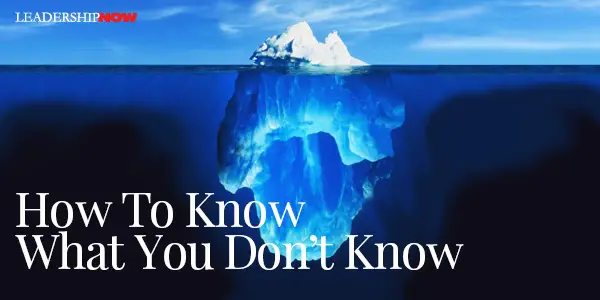
HAVING studied some of the biggest decisions of our time, Michael Roberto is an expert on decision making. But his new book is not about decision-making. Not exactly anyway. Something Robert McNamara said to him made him take a step back. McNamara said that while business schools dutifully teach decision making, in the real world, identifying the true problem often proves to be the bigger issue. Have you ever found that you were working on a solution to the wrong problem? Of course, knowing that a problem exists at all is first the critical step. Too frequently, we uncover the problem too late and the small issue has become a major problem. By now, we are all well acquainted with this scenario. Roberto writes, “Small problems often precede catastrophes. In fact, most large-scale failures result from a series of small errors and failures, rather than a single root cause.”Peggy Noonan recently wrote in her weekend column, “Every new president starts out fresh, in part because he doesn’t know what he doesn’t know. Ignorance keeps you perky.” It also makes you vulnerable. So a leader must become a good problem-finder. We need to get good at knowing what we don’t know. The purpose of Michael Roberto’s book, Know What You Don’t Know, is to help us do just that – become an expert at finding problems. It’s an important book on a timely – if not ever-present – issue. Problem-finding is an ongoing process and a bit of a trick. Simply asking won’t give you the answer. People are prone to tell you what you want to hear. People tend to do – and think nothing of – what makes sense to them, but it might not make sense in the context of what you are trying to accomplish. So you have to learn to read between the lines and connect the dots. It requires intuition. Improving that capability is essential to your success so that when you do put two and two together, you get four and not something else. You have to create a learning environment where people are allowed to make mistakes and learn from them. And they need to be trained how to communicate their thoughts and allow others to communicate theirs without shutting them down. Through numerous examples he shows how people have improved their problem-finding skills. Many of these examples can be applied in a wide variety of contexts. A successful leader must develop the mindset of a problem-finder. This, Roberto says, is not just another set of behaviors and competencies. It begins with “a certain level of intellectual curiosity. You must be willing to ask questions, seeking always to learn more about both the familiar and the unfamiliar…. Perhaps most importantly, you must be willing to question your own prior judgments and conclusions.” (And have enough humility to even think that that is necessary.) You also must “embrace systemic thinking.” A good problem-finder recognizes “that small problems often do not occur due to the negligence or misconduct of an individual. Instead, small errors frequently serve as indicators of broader systemic issues in the organization.” It might be prudent, in the aftermath of a major problem, to use it as an opportunity to look at the “whole” organization for contributing factors. Finally, Roberto says you need to have a healthy paranoia. “Effective problem-finders acknowledge that every organization, no matter how successful, has plenty of problems.” And that’s OK. “Effective problem-finders acknowledge their personal fallibility, rather than cultivating an aura of invincibility.” Roberto concludes, “Successful leaders do not see problems as threats. They see every problem as an opportunity to learn and improve.” Leave no stone unturned. 
Posted by Michael McKinney at 12:11 AM
02.26.09

Why Problems Hide
Problems remain hidden in organizations for a number of reasons. First, people fear being marginalized or punished for speaking up in many firms, particularly for admitting that they might have made a mistake or contributed to a failure. Second, structural complexity in organizations may serve like dense "tree cover" in a forest, which makes it difficult for sunlight to reach the ground. Multiple layers, confusing reporting relationships, convoluted matrix structures, and the like all make it hard for messages to make their way to key leaders. Even if the messages do make their way through the dense forest, they may become watered down, misinterpreted, or mutated along the way. Third, the existence and power of key gatekeepers may insulate leaders from hearing bad news, even if the filtering of information takes place with the best of intentions. Fourth, an overemphasis on formal analysis and an underappreciation of intuitive reasoning may cause problems to remain hidden for far too long. Finally, many organizations do not train employees in how to spot problems. Issues surface more quickly if people have been taught how to hunt for potential problems, what cues they should attend to as they do their jobs, and how to communicate their concerns to others. Adapted from Know What You Don't Know: How Great Leaders Prevent Problems Before They Happen by Michael A. Roberto
Posted by Michael McKinney at 12:51 AM
02.23.09

Procrastination: THE Results Killer!Tony Jeary is a coach to the world's top CEOs and high achievers and is the author of a very practical book, Strategic Acceleration: Succeed at the Speed of Life. When we look at the work before us, it’s easy to procrastinate. Jeary suggest we are focusing on the wrong thing. “To avoid procrastination and get faster results,” he writes, “focus on starting instead of finishing, then adjust as you go.” He offers this helpful outlook on procrastination:Anyone interested in getting better results, becoming more productive and ultimately more successful should probably take an honest look at the problem of procrastination. Most people think procrastination is just an issue that involves putting things off that can be done later without much of a penalty. That idea just scratches the surface of the procrastination issue and is indicative of the denial people have about it. Truthfully, procrastination is like an addiction because it is the symptom of a thinking problem and like any other addiction, its difficult to break! The reality is this: Nothing marginalizes results more than procrastination because being productive and getting superior results is about completing tasks and projects in reduced time frames. Obviously, if you can get more work done in less time, you will see results much faster. We are all guilty of procrastination to some extent, and there are two kinds:
If you want to accelerate results, there is no room in your life or your business for Negative Procrastination. Show me a person who consistently gets less than stellar results, and I'll show you a person who procrastinates. However, they probably won't think of themselves as procrastinators because they have lots of seemingly good reasons for not doing things TODAY. You may find some of the following statements familiar. You have probably either heard them from other people, or you may have even believed one or more of them yourself. If you feel a personal kinship with these statements, I suggest that you give serious thought to the possibility that there might be a touch of procrastination in your own life. Consider the following statements:
Posted by Michael McKinney at 09:34 AM
02.18.09

Goldsmith's Gold: You Are Under the Microscope
In his excellent Succession from Harvard’s Memo to the CEO series, he explains: Let’s face it: your successor, like you, will spend hour after hour listening to potentially boring PowerPoint presentations—on topics that he has already been briefed on. He needs to realize that those presentations may be the summary of months of effort by employees at all levels in your organization. He needs to understand how much these employees care about their CEO’s reaction. He will need to actively listen—and communicate with caring, interest, and enthusiasm—no matter how tired he may feel on the inside. He needs to realize that everyone will not only be listening to his words—everyone will be watching his face. Signs of boredom or indifference that may be ignored if coming from peers can be demoralizing when coming from CEOs. Signs of recognition and support can validate employees and provide needed recognition and inspiration after a great effort. 
Posted by Michael McKinney at 07:22 AM
02.16.09

The 100 Best Business Books of All TimeIt’s a jungle out there! With over 40 business books published each day, you can’t possibly keep up. Fortunately, Jack Covert and Todd Sattersten have written a guidebook to help you navigate your way through the thousands of business books that have been published, talked about, referred to and in some cases, largely forgotten. The 100 Best Business Books of All Time takes you on a journey through the pages of books that have made a difference. It will help you to reacquaint yourself – in some cases – and to explore uncharted territory in others, in your search for useful ideas and choices to help you in your work.The books were chosen based on three general criteria:
The resulting list is wide-ranging. You’ll find included on the list, books from Peter Drucker to the fictional work of Dr. Seuss, Oh, the Places You'll Go. All of the books included have been thoughtfully considered. Of course, no list of books is without detractors. You won’t agree with every book on the list. But that’s really the value of a book. It is a personal thing that can speak to each one of us in a different way depending on where we are at and what we are faced with. I often find that the value of a book can be the books that it leads you to. Through a book's bibliography you can both dissect the author’s thinking and build on it. A book like The 100 Best Business Books of All Time can help you find a gem of an idea in unexpected places. Some books are so poorly titled they don’t draw you in or seem so off-point. Some have a great single point that is hopelessly shrouded in fluff that you never see it. Covert and Sattersten have done a lot of the initial leg-work for you. The short reviews are organized into twelve categories. They are well written and try to flush out the benefit of the book being reviewed. They are followed by links to books of similar thought to help you find additional advice on a relevant topic. They say that reading about work, business, or leadership can change you – change the way you relate to other people, can change the way you see the world, can change the way you think about your career and the story-line of your life. This book can certainly help you to achieve your goals by helping you to navigate through the jungle of ideas available to locate that specific piece of the puzzle needed to complete your picture.
Posted by Michael McKinney at 10:35 AM
02.13.09

Lincoln’s Lessons: Invest In Who You Are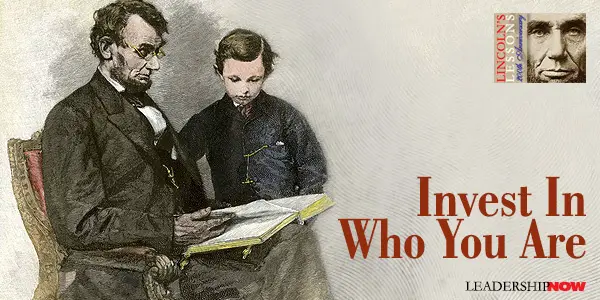
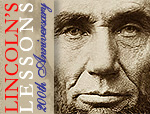 Newspaperman Horace Greeley once said of Lincoln, “Lincoln gladly profited by the teaching of events and circumstances, no matter how adverse or unwelcome….There was probably no year of his life that he was not a wiser, cooler, better man than he had been the year preceding.” This quality alone no doubt allowed Lincoln to grow into a fully integrated man. He invested in “who” he was and not just the “what” of the work he was doing. The “who” makes the “what.” The experiences of his life gave him the ability to face the negatives with clarity and resolve. He learned that, most often, the only way out is through. He learned to be able to judge the dilemmas that often arise from navigating strong convictions and the demands of the moment. This only comes about by knowing who you are and what you believe. The quality that most defined Lincoln was his internal consistency or wholeness. Integrity is the key to influence. Lincoln's contemporaries sensed his integrity in everything he did, a quality that still moves people today. Lincoln once described the workings of his mind to his friend Joshua Speed. He said, “I am slow to learn and slow to forget that which I have learned. My mind is like a piece of steel—very hard to scratch anything on it and almost impossible thereafter to rub it out.” William Lee Miller points out in Lincoln's Virtues, that Lincoln was good at finding the crux of the matter. “He would become a thinker in particular about moral ideals as they intersect with politics. And his qualities of mind meant that not only facts and ideas, once acquired, stayed with him, but that political and moral positions, once he worked them out, would not be lightly abandoned.” Lincoln was not without fear, however. Yet even with his doubts and fears, Lincoln possessed a hope that was rooted in character. “The hope is not that suffering will go away, for with Lincoln it did not ever go away,” writes Joshua Shenk in Lincoln’s Melancholy. “The hope is that suffering, plainly acknowledged and endured, can fit us for the surprising challenges that await.” Of Related Interest:
Posted by Michael McKinney at 12:10 AM
02.12.09

Lincoln’s Lessons: Humor Communicates Like Nothing Else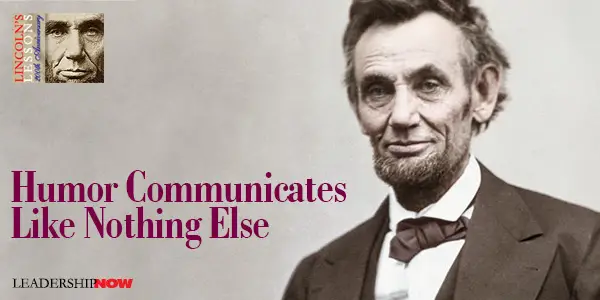
 Though he carried a great burden, he used stories and jokes to persuade people and to break the tension. He enjoyed sharing an anecdote, a joke or a story with nearly everyone he came into contact with. Battle correspondent Henry Villard recalled that “None of his hearers enjoyed the wit—and wit was an unfailing ingredient—of his stories half as much as he did himself. It was a joy indeed to see the effect upon him….A high-pitched laughter lifted up his otherwise melancholy countenance with thorough merriment. His body shook all over, and when he felt particularly good over his performance, he followed his habit of drawing his knees, with his arms around them, up to his very face.” Lincoln used humor to communicate more effectively. He used it to make a point, to motivate or just to make people feel at ease. He knew people were more easily persuaded by a story or a joke than in almost any other way. He said, “I believe I have the popular reputation of being a storyteller, but I do not deserve the name in its general sense, for it is not the story itself, but its purpose, or effect, that interests me. I often avoid a long and useless discussion by others or a laborious explanation on my own part by a short story that illustrates my point of view. So, too, the sharpness of a refusal or the edge of a rebuke may be blunted by an appropriate story, so as to save wounded feeling and yet serve the purpose. No, I am simply a storyteller, but story-telling as an emollient saves me much friction and distress.” Treasury official Chauncey M. Depew recalled, "Several times when I saw him, he seemed to be oppressed not only with the labors of the position, but especially with care and anxiety growing out of the intense responsibility which he felt for the issue of the conflict and the lives which were lost. He knew the whole situation better than any man in the administration and virtually carried on in his own mind not only the civic side of the government but all the campaigns. And I knew when he threw himself (as he did once when I was there) on a lounge, and rattled off story after story, that it was his method of relief, without which he might have gone out of his mind, and certainly would not have been able to have accomplished anything like the amount of work which he did." Not everyone appreciated his many jokes or thought they were appropriate. But Lincoln used them to good effect. He once said, “I tell you the truth when I say that a funny story, if it has the element of genuine wit, has the same effect on me that I suppose a good square drink of whisky has on an old toper; it puts new life into me. The fact is I have always believed that a good laugh was good for both the mental and the physical digestion.” Probably more to the point, he remarked, “I laugh because I must not weep—that’s all, that’s all.” Of Related Interest:
Posted by Michael McKinney at 01:14 AM

Abraham Lincoln Was Born 200 Years Ago TodayAbraham Lincoln was born 200 years ago on this day, February 12, 1809, in Hardin County, Kentucky to Thomas and Nancy Lincoln. Abraham was their second child and took his name from his paternal grandfather. He had an older sister named Sarah. He was the first President to be born outside the 13 original colonies. Also on this day, Charles Darwin was born. The world was changing. The Industrial Revolution was in full swing. The day before, Robert Fulton patented his steamboat. An invention that would prove to change the course of commerce throughout the world. A few weeks later, on March 4, James Madison took the oath as the 4th President of the United States, succeeding Thomas Jefferson.Just five years before, the nation doubled in size with the negotiation of the Louisiana Purchase from France in 1803. It was a country more interested in things domestic than foreign. Also born in 1809 were William Gladstone, Alfred Lord Tennyson, and Edgar Allan Poe. Of Related Interest:
Posted by Michael McKinney at 01:12 AM
02.11.09

Lincoln’s Lessons: Endure Unjust Criticism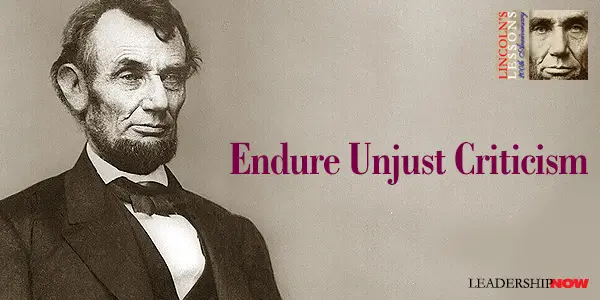
 Most of the time, Lincoln ignored criticism. He knew it would come. It had always been so. He wrote, “Human nature will not change. In any future great national trial, compared with the men of this, we shall have as weak and as strong, as silly and as wise, as bad and as good.” Only when he deemed it important enough to make a difference did he engage in the attack and offer a rebuttal and defend himself. But always, he kept a good sense of humor. He chose not to brood over unjust criticism. He advised, “Jealousy and suspicion never did help any man in any situation. There may sometimes be ungenerous attempts to keep a young man down, and they will succeed, too, if he allows his mind to be diverted from its true channel to brood over the attempted injury. Cast about, and see if this feeling had not injured every person you have known to fall into it.” Lincoln avoided quarreling, resentments and malice. He tried to exhibit patience and grace. Possessed with a sense of purpose greater than himself, he was able to look past petty concerns. In a letter to Cuthbert Bullitt he wrote, “I shall do nothing in malice. What I deal with is too vast for malice dealing.” Any leader will be criticized. How you handle it will determine whether or not you succeed or fail. In the Old Testament, God corrected Balaam through the mouth of a … uh … donkey. Any of us might be edified in the same way. It is best to endure criticism, learn what you can, and move on in spite of it. Of Related Interest:
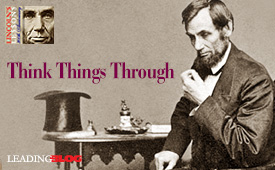 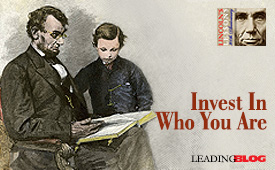
Posted by Michael McKinney at 03:57 AM
02.10.09

Lincoln’s Lessons: Listen To and Value Others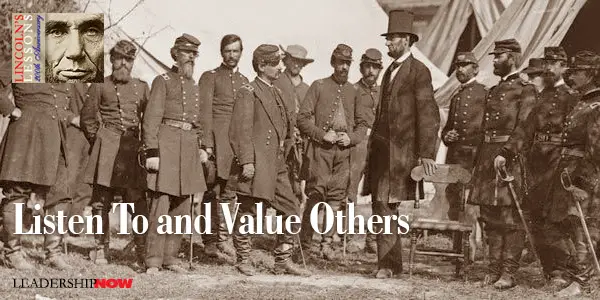
 Lincoln took the time to cultivate personal relationships with his subordinates so he could learn from them. He showed them respect even when their opinions differed and he made it clear that he valued their opinions. Lincoln's emphasis on soliciting the ideas of others and his concern for them is illustrated well in a story that Paul Johnson records in his book Heroes. “After the fall of Richmond, the Confederate capital, and on the same day Robert E. Lee finally surrendered, Lincoln went to see his secretary of state, with whom he often disagreed, and whom he did not particularly like. Seward had somehow contrived to break both his arm and his jaw. Lincoln found him not only bedridden but unable to move his head. Without a moment’s hesitation, the president stretched out at full length on the bed and, resting on his elbow, brought his face near Seward’s, and they held an urgent, whispered conversation on the next steps the administration should take. Then Lincoln talked quietly to the agonized man until he drifted off to sleep.” Johnson concludes, “Lincoln could easily have used the excuse of Seward’s incapacity to avoid consulting him at all. But that was not his way. He invariably did the right thing, however easily it might have been avoided. Of how many other great men might this be said?” Lincoln found time for individuals. Of Related Interest:
 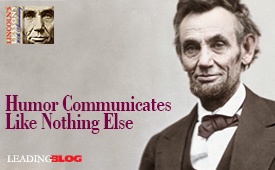
Posted by Michael McKinney at 12:07 AM
02.09.09

Lincoln's Lessons: Think Things Through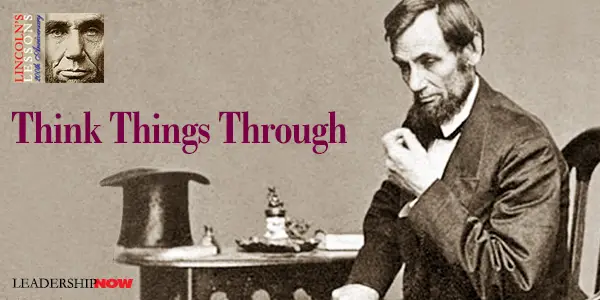
 Lincoln is not advocating indecisiveness; rather he is encouraging us to get all of the facts before deciding a matter. Especially in a time of crisis, calm, measured thought is important. Lincoln demonstrated the will to make tough decisions and without hesitation when necessary. But he insisted on getting all of the information available before making a decision. Often this entailed going out personally to get the facts firsthand. He took the time to consider all available solutions and their consequences. Furthermore, by selecting a solution that was consistent with his values and objectives, he was able to weave a theme through his decisions – connecting them – and build trust and authenticity in his leadership. Too often, issues are examined only in one dimension or by considering only the loudest voices. Rarely is that enough. It often leads to unintended consequences and inconsistent behavior. When you have taken the time to think a thing through, you will be better able to have the courage to stand behind your decisions and accept the consequences. You will possess a determinism born of conviction and not stubbornness. Of Related Interest:
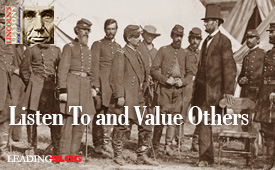 
Posted by Michael McKinney at 01:21 AM

Books About Abraham LincolnOn the occassion of 200th Anniversary of Abraham Lincoln's birth on February 12, we have assembled a list of some of the better books about Lincoln:





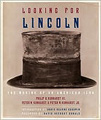
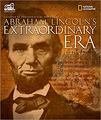

Posted by Michael McKinney at 01:19 AM
02.06.09

Mastering UncertaintyNeal A. Hartman, a senior lecturer in behavioral and policy sciences at Sloan School of Management, MIT, offers this advice in the Financial Times, concerning how a leader should behave in this uncertain business environment.Managers must also pay close attention to their own actions during uncertain times. Because many people perceive uncertainty as frightening, leaders need to display behavior that brings about a sense of trust and credibility. Uncertainty is often a source of stress, but it is how people react to this stress that determines the kind of decision-making that occurs. Effective managers are those who develop the emotional maturity to behave rationally and confidently in stressful and uncertain situations and they must nurture this ability in their employees as well.
Posted by Michael McKinney at 12:26 PM
02.05.09

Lessons From FDR's Cabinet
With a nod to Albert Einstein, we can't change the system by using the same kind of people we used to create it. Adam Cohen’s has written a very relevant book, Nothing to Fear about Franklin Roosevelt’s first hundred days in 1933. Here is an edited excerpt regarding the Cabinet he selected. It had the distinction of being sworn in at once on the same afternoon after his inauguration. The Cabinet had gotten a lukewarm reception when Roosevelt announced it. Arthur Knock of the Times declared that “its composite trait seems to me to be diligence; brilliance it lacks completely.” The new Cabinet was criticized for lacking “big men.” One Republican congressman wisecracked that Roosevelt had kept his promise to look out for the “forgotten men,” since his Cabinet contained “nine of them and one woman.” Adapted from Nothing to Fear: FDR's Inner Circle and the Hundred Days That Created Modern America by Adam Cohen
Posted by Michael McKinney at 06:17 PM
02.02.09

First Look: Leadership Books February 2009Here's a look at some of the best leadership books to be released in February.




Posted by Michael McKinney at 09:22 AM
|
BUILD YOUR KNOWLEDGE


How to Do Your Start-Up Right STRAIGHT TALK FOR START-UPS 
Grow Your Leadership Skills NEW AND UPCOMING LEADERSHIP BOOKS 
Leadership Minute BITE-SIZE CONCEPTS YOU CAN CHEW ON 
Classic Leadership Books BOOKS TO READ BEFORE YOU LEAD |
|